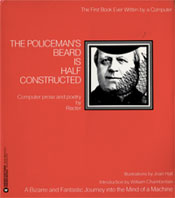

|
 historical historical
 ubuweb ubuweb
|
Racter | 1984 
 The Policeman's Beard Is Half-Constructed (1984) [PDF, 33mb] The Policeman's Beard Is Half-Constructed (1984) [PDF, 33mb]
Introduction With the exception of this introduction, the writing in this book was all done by a computer. The book has been proofread for spelling but otherwise is completely unedited. The fact that a computer must somehow communicate its activities to us, and that frequently it does so by means of programmed directives in English, does suggest the possibility that we might be able to compose programming that would enable the computer to find its way around a common language "on its own" as it were. The specifics of the communication in this instance would prove of less importance than the fact that the computer was in fact communicating something. In other words, what the computer says would be secondary to the fact that it says it correctly. Computers are supposed to compute. They are designed to accomplish in seconds (or microseconds) what humans would require years or centuries of concerted calculation effort to achieve. They are tools we employ to get certain jobs done. Bearing this in mind, the question arises: Why have a computer talk endlessly and in perfect English about nothing? Why arrange it so that no one can have prior knowledge of what it is going to say? Why? Simply because the output generated by such programming can be fascinating, humorous, even aesthetically pleasing. Prose is the formal communication of the writer's experience, real and fancied. But, crazy as this may sound, suppose we remove that criterion: suppose we somehow arrange for the production of prose that is in no way contingent upon human experience. What would that be like? Indeed, can we even conceive of such a thing? A glance through the following pages will answer these questions. There would appear to be a rather tedious method of generating "machine prose," which a computer could accomplish at great speed but which also might be attempted (though it would take an absurdly long time) by writing thousands of individual words and simple directives reflecting certain aspects of syntax on slips of paper, categorizing them in some systematic fashion, throwing dice to gain a random number seed, and then moving among piles of these slips of paper in a manner consistent with a set of arbitrary rules, picking a slip from Pile A, a slip from Pile B, etc., thereby composing a sentence. What actually was on the slip of paper from any given pile would be irrelevant; the rules would stipulate the pile in question. These hypothetical rules are analogous to the grammar of a language; in the case of our present program, which is called Racter, the language is English. (The name reflects a limitation of the computer on which we initially wrote the program. It only accepted file names not exceeding six characters in length. Racter seemed a reasonable foreshortening of raconteur.) Racter, which was written in compiled BASIC on a Z80 micro with 64K of RAM, conjugates both regular and irregular verbs, prints the singular and the plural of both regular and irregular nouns, remembers the gender of nouns, and can assign variable status to randomly choosen "things." These things can be individual words, clause or sentence forms, paragraph structures, indeed whole story forms. In this way, certain aspect so the rules of English are entered into the computer. This being the case, the programmer is removed to a very great extent from the specific form of the system's output. This output is no longer a preprogrammed form. Rather, the computer forms output on its own. What the computer "forms" is dependent upon what it finds in its files, and what it can find is an extremely wide range of words that are categorized in a specific fashion and what might be called "syntax directive," which tell the computer how to string the words together. An important faculty of the program is its ability to direct the computer to maintain certain randomly chosen variables (words or phrases), which will then appear and reappear as a given block of prose is generated. This seems to spin a thread of what might initially pass for coherent thinking throughout the computer-generated copy so that once the program is run, its output is not only new and unknowable, it is apparently thoughtful. It is crazy "thinking," I grant you, but "thinking" that is expressed in perfect English. The prose and poetry pieces have been illustrated by fanciful collages [not included in this UbuWeb edition] quite in keeping with the flavor of the computer-generated copy. Bill ChamberlainNew York City March 1984 RELATED RESOURCES:  Full Text Edition in the UbuWeb Anthology of Conceptual Writing Full Text Edition in the UbuWeb Anthology of Conceptual Writing |